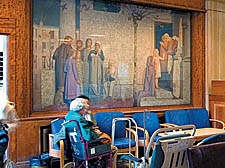| |

Cayley Robinson’s Acts of Mercy as it was |
Tate Britain ‘saves’ hospital paintings
Hospital bosses’ u-turn on Cayley Robinson art
HOSPITAL chiefs have bowed to public pressure to stop the controversial sale of four paintings after thrashing out a deal with Tate Britain.
Board members at University College London Hospital voted to halt the sale of four massive paintings by Frederick Cayley Robinson, donated to the hospital in the early 1900s.
Following a public campaign to save the massive paintings from falling into private hands, UCLH chairman Peter Dixon has admitted the hospital had no idea the public cared so much.
Mr Dixon told the meeting Tate Britain director Dr Stephen Deuchar had stopped short of buying the paintings but instead offered to conserve and store them for free until a home can be found within one of the hospital’s new buildings.
He added: “We do try to listen to what people say to us even if it’s inconvenient. We’ll put them in the Tate basement somewhere and I hope we can find a suitable way forward in terms of displaying them. The downside is we would need to find funding for our arts programme. I’ve had some productive discussions with Mr Deuchar and he’s very keen to help with our arts programme in every way except giving us money.”
However, the paintings are not completely out of the woods. If a suitable home isn’t found within five years, the hospital has reserved the right to put them on the market again.
Up until yesterday’s u-turn the hospital had stood firm on the decision to offload the paintings which were left without a home following the £175 million sale of the Middlesex Hospital last June.
The decision to place the paintings into auctioneers Christie’s hands was made following a report by the hospital’s art curator Guy Noble which said: “Times have changed and the works are not really suited to the new UCH”.
Following a public outcry, the sale was deferred and a deadline set for this month.
But the board’s resolve eventually swayed following revelations at the hospital’s annual meeting in September that Peter Dixon had promised in a letter to Charlotte Street Association chairman Max Neufeld in 2003 “we would certainly not consider permanent disposal”.
Mr Neufeld, who produced Mr Dixon’s letter at the annual meeting, said: “It’s always difficult for a public body to reconsider an earlier decision and we welcome that they have done this.
“Tate’s contribution has been very positive and the important thing is to decide the best way of keeping these paintings.” |
 |
|
| |
| |